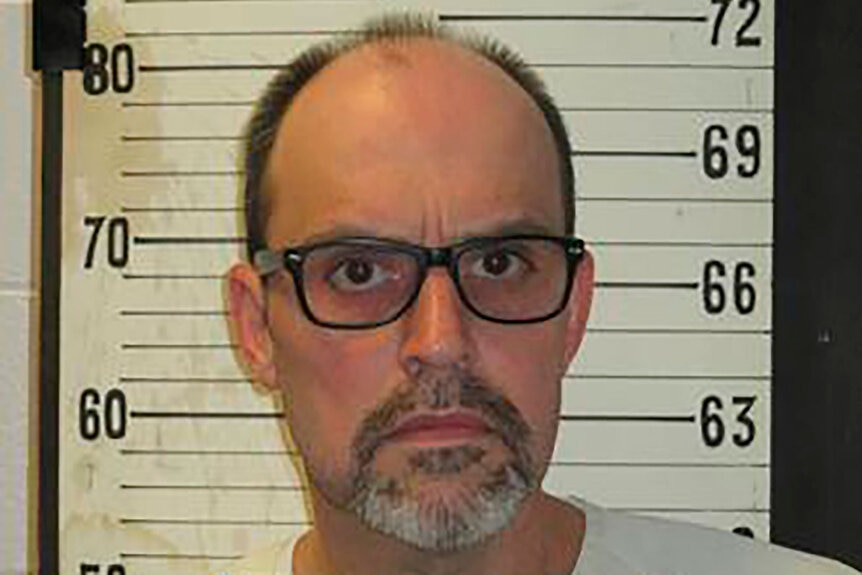Create a free profile to get unlimited access to exclusive videos, breaking news, sweepstakes, and more!
Death Row Inmate Who Burned Ex-Girlfriend Alive Could Become Second Blind Prisoner Ever Executed In U.S.
In 1991, Lee Hall hurled a Molotov cocktail he had constructed out of a tea jug through the driver’s side window of Traci Crozier's car while she sat inside. His lawyers argue executing him would be particularly cruel and unusual, given his blindness.
A death row inmate suffering from glaucoma — and and who burned his ex-girlfriend alive using a makeshift gasoline bomb in 1991 — could become the second blind prisoner in U.S. history to be sentenced to death since capital punishment was reinstated in 1976.
Lee Hall, 53, who is “functionally blind,” his lawyers said, was convicted for murdering his ex-girlfriend Traci Crozier nearly three decades ago. He’s scheduled to be executed Thursday.
Hall’s legal team had previously argued that executing a blind person is a “rare occurrence,” which amounts to “cruel and unusual punishment.”
“Lee Hall is blind and vulnerable,” his attorneys wrote in a 2018 court petition for commutation of his death sentence obtained by Oxygen.com. “If confined to prison for the remainder of his natural life, Mr. Hall bears no practical risk of harm to anyone. The spectacle of his execution — guiding him to the gurney — ‘would offend humanity.’”
Clarence Ray Allen — a petty criminal who was put to death in California in 2006 after ordering a triple murder from a prison cell — is the only other blind inmate to be executed since the 1970s, his lawyers said.
Hall's defense attorneys also argue his pending execution was exceptionally cruel since blind people “experience pain more acutely than sighted persons.” Hall has opted to be executed using an electric chair.
Hall was diagnosed with glaucoma in 2010. He could supposedly see at the time of Crozier’s murder, but has since been rendered “functionally blind.” His lawyers contended that prison doctors failed to diagnose Hall’s condition early on, and that correctional staff ignored his diagnosis, delayed medical appointments, and didn’t provide the proper eye medications, allowing his vision to further deteriorate.
“The Tennessee Department of Correction has routinely failed to comply with the directions and recommendations of Mr. Hall's eye doctors,” his lawyers wrote.
Nonetheless, Hall’s case highlights a growing concern amongst some criminal justice advocates, who argue that the population of death row inmates is aging rapidly, which state prisons are increasingly ill-equipped to address.
“Many of the prisoners that we see on death row now approaching execution are people who have been in the appellate process for decades,” Robert Dunham, the executive director of the Death Penalty Information Center, told Oxygen.com.
Dunham, whose organization tracks and provides analysis on capital punishment trends, suspects that Hall’s glaucoma could have been treated, preventing the onset of blindness.
“It’s highly probable that [Hall] is blind as a result of the absence of appropriate medical care,” Dunham explained.
Apart from subpar healthcare, Dunham said that the hostile nature of death row puts inmates under “unimaginable” amounts of stress, which often exacerbates pre-existing medical conditions, which can sometimes lead to a botched execution.
“It has very serious physical and mental health consequences,” Dunham explained. “On top of that, death row prison conditions are extremely harsh and states very frequently do not provide anything close to adequate medical care to prisoners who are on death row. In the case of Lee Hall, that means that his glaucoma, which could have been easily addressed, was inadequately treated, and he has since become blind.”
Vernon Madison, 67, who was sentenced to death for shooting a police officer in Mobile, Alabama in 1985, also reportedly went blind on death row after a bout with diabetes and several strokes, as well as suffering subsequent brain damage. Madison’s death sentence was later tossed out due to health reasons, however it was largely due to his advanced dementia and other psychological issues, rather than his blindness, according to the 2018 Supreme Court opinion on his case.
Hall was convicted in his ex-girlfriend Crozier’s killing in 1992. Shortly before her death, he stopped at a gas station, “filled [a] tea jug with gasoline,” stuffed the top with paper towel, and bought a cigarette lighter, according to court records. After getting into an argument with Crozier, then 22, Hall ignited his makeshift explosive and lobbed it through the driver’s side window of her car while she was still inside. She suffered burns to “more than 90 percent of her body.” He later claimed he hadn’t meant to kill her.
“My sister was blind, too, because of him when she died — she was burnt alive,” Traci’s sister, Staci Crozier Wooten, told Oxygen.com.
“She couldn’t see anymore when she died so I don’t have any mercy for him.”
Wooten, 49, said her family has been praying for Hall’s execution for nearly 30 years. She described the past few decades as a “roller coaster.”
“Traci can be at peace and our whole family can be at peace,” she said. “He needs to be put to death for what he did to her. That’s what he needs to do — he needs to die and quit putting our family through all this.”
Wooten remembered her sister as a “happy person” who had “a lot of friends.”
“I loved my sister to death,” she added. “She’s greatly missed. I’d do anything to have her back. I know this isn’t going to bring her back and I really hate that another life has to be lost but, you know, he has to pay for what he’s done.”
Most recently, Hall’s legal team made a final, eleventh hour effort to shelve his conviction altogether, arguing one of the jurors who rendered his original guilty verdict during the 1992 trial was biased. The juror, who they said only came forward months ago, had failed to disclose she was a victim of “extensive domestic violence.” The woman admitted to being raped and beaten by her first husband, who fatally shot himself in the head in 1975 prior to Hall’s trial, court documents stated. The juror later testified that she “hated” Hall when he gave testimony in the 1990s.
Hall’s lawyers demanded the case be thrown out, alleging that the juror couldn’t be impartial given her past history of being domestically abused.
“Juror A failed to disclose her traumatic experiences when completing her jury questionnaire and in answering questions during voir dire,” Hall’s lawyers wrote in a petition filed in October.
A Tennessee judge ultimately ruled against Hall, noting he had already exhausted previous motions for post-conviction relief, citing a failed petition in 2015. Judge Don Poole also wrote that “any prejudice or hatred” the juror “may have felt toward [Hall] was fleeting at best.”
On Tuesday, the Supreme Court of Tennessee upheld Poole’s ruling, declining to further push back Hall’s execution date.
Hall’s execution is scheduled for 7 p.m. on Thursday, according to the Tennessee Department of Correction. Prison officials said Hall has been moved to a cell near the execution chamber where he’ll be under “death watch,” and monitored around the clock for the next two days.



























